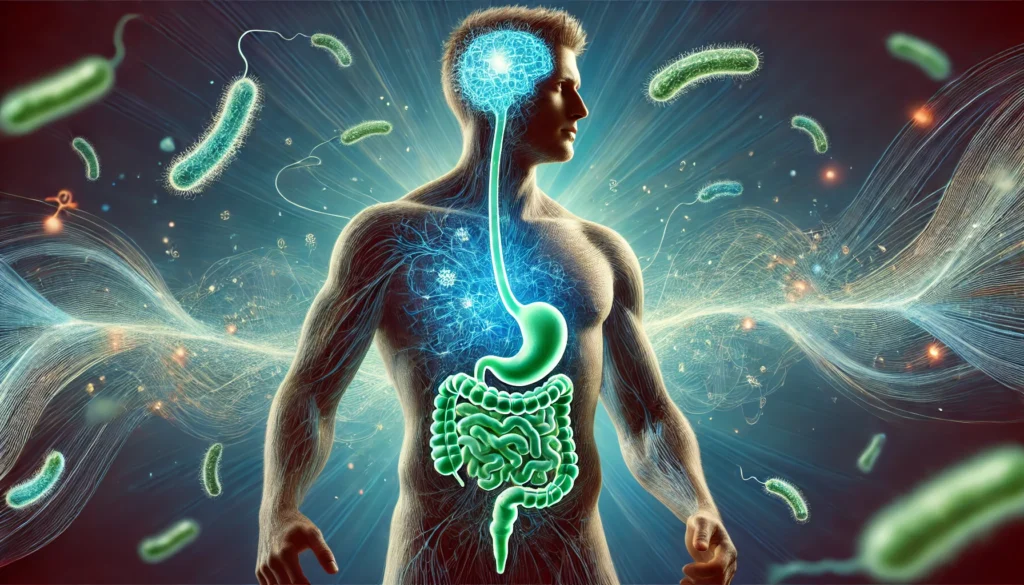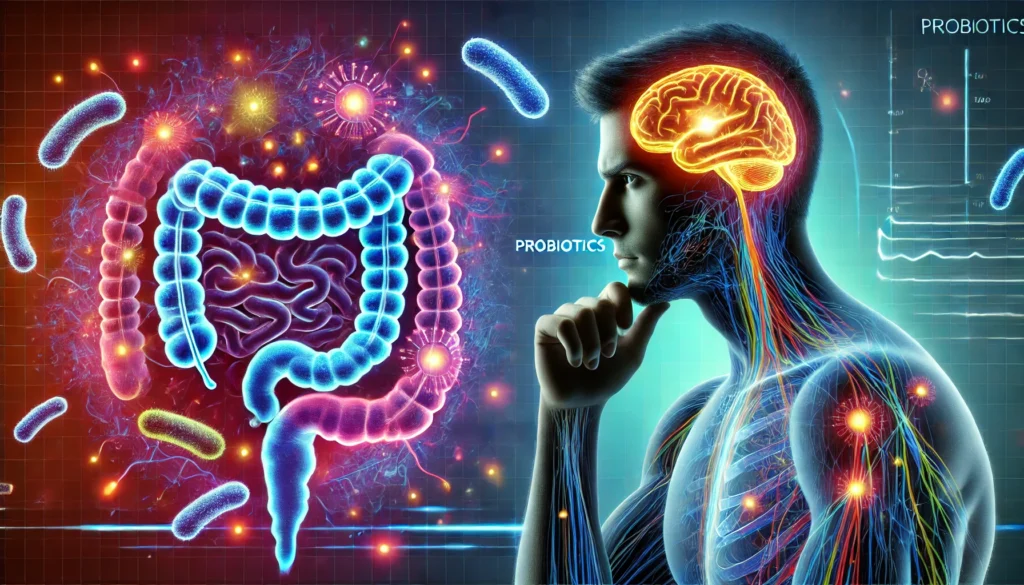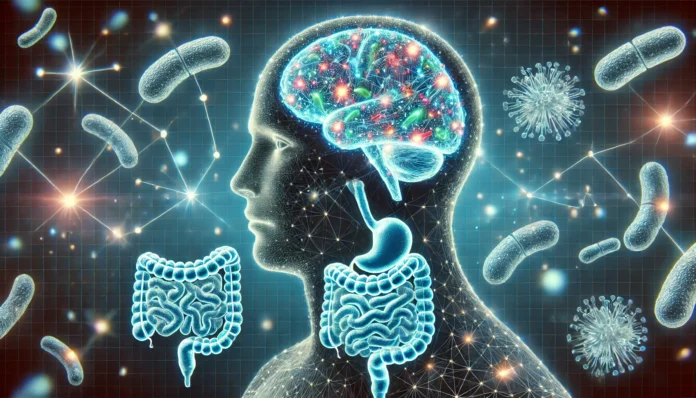Introduction: The Gut-Brain Connection and the Role of Probiotics
The human body is a complex ecosystem where multiple systems interact to maintain overall health. One of the most significant yet often overlooked relationships is the gut-brain axis, a bidirectional communication system linking the digestive system to the central nervous system. Recent research has highlighted the profound impact that gut microbiota—trillions of microorganisms residing in the intestines—can have on mental health and cognitive function. As the understanding of this connection grows, probiotics for men are gaining attention as a powerful tool for supporting not only digestive health but also mental well-being and cognitive performance.
You may also like: How to Improve Gut Health Naturally: Science-Backed Tips for a Stronger Microbiome
Probiotics are live bacteria and yeasts that provide numerous health benefits when consumed in adequate amounts. While traditionally associated with digestive health, emerging evidence suggests that they also influence neurotransmitter production, stress response, and brain function. This article explores how the best probiotic for men can enhance mental health, improve cognitive function, and promote overall well-being. By understanding the specific strains, mechanisms of action, and practical applications, men can make informed decisions about integrating probiotics into their daily routines.
The Science Behind Probiotics and Mental Health
The Gut Microbiome and Neurotransmitter Production
The gut microbiome plays a critical role in producing key neurotransmitters such as serotonin, dopamine, and gamma-aminobutyric acid (GABA). These chemical messengers regulate mood, stress response, and cognitive function. An imbalance in gut bacteria—known as dysbiosis—can disrupt neurotransmitter production and contribute to conditions such as depression, anxiety, and brain fog.
Probiotics help restore balance by replenishing beneficial bacteria, reducing inflammation, and enhancing gut barrier function. Strains such as Lactobacillus rhamnosus, Bifidobacterium longum, and Lactobacillus helveticus have been shown to influence the brain’s stress response, reduce anxiety symptoms, and improve cognitive flexibility. Studies indicate that these probiotic strains may also promote neuroplasticity, the brain’s ability to reorganize itself in response to new experiences and learning.
Inflammation and Brain Function
Chronic inflammation is a common factor underlying both mental health disorders and cognitive decline. The gut microbiome significantly influences systemic inflammation through the production of short-chain fatty acids (SCFAs), which have anti-inflammatory properties. When the gut barrier is compromised, harmful substances such as lipopolysaccharides (LPS) can enter the bloodstream and trigger neuroinflammation, leading to mood disorders and impaired cognitive function.
Probiotics for men can counteract this process by strengthening the intestinal lining, modulating immune function, and promoting the growth of beneficial bacteria. Bifidobacterium bifidum and Lactobacillus plantarum have been particularly effective in reducing markers of inflammation and improving mental clarity.
Stress Response and the Hypothalamic-Pituitary-Adrenal (HPA) Axis
The HPA axis regulates the body’s response to stress by controlling cortisol levels. Chronic stress can lead to HPA axis dysregulation, resulting in elevated cortisol levels, increased anxiety, and reduced cognitive performance. The gut microbiome influences HPA axis function through microbial metabolites that interact with the central nervous system.
Probiotics such as Lactobacillus rhamnosus and Bifidobacterium breve have been shown to reduce cortisol levels, improve stress resilience, and enhance cognitive function under pressure. By maintaining a balanced gut microbiome, these probiotics support emotional stability and mental clarity.

Choosing the Best Probiotic for Men’s Mental Health
Key Strains for Cognitive Function and Mood Enhancement
Not all probiotics offer the same benefits, so selecting strains with scientifically validated effects on mental health is essential. Some of the best probiotic strains for men seeking cognitive and emotional support include:
- Lactobacillus rhamnosus (JB-1) – Reduces stress-induced anxiety and enhances GABA production.
- Bifidobacterium longum 1714 – Modulates cortisol levels and improves mental clarity.
- Lactobacillus helveticus R0052 – Promotes emotional resilience and reduces symptoms of depression.
- Bifidobacterium bifidum – Supports cognitive function and protects against neuroinflammation.
- Lactobacillus plantarum – Enhances memory and learning ability by reducing oxidative stress.
Probiotic Delivery Methods: Supplements vs. Fermented Foods
Probiotics can be consumed through supplements or fermented foods. While supplements provide a concentrated and consistent dose of beneficial bacteria, fermented foods offer additional nutrients and bioactive compounds that support gut health. Some of the best sources of probiotics for men include:
- Yogurt – Rich in Lactobacillus and Bifidobacterium strains.
- Kefir – Contains diverse probiotic strains and beneficial yeast.
- Sauerkraut and Kimchi – Fermented cabbage rich in lactic acid bacteria.
- Miso and Tempeh – Fermented soy products that support digestive and immune function.
Factors to Consider When Selecting a Probiotic Supplement
When choosing a probiotic supplement, men should consider several factors to ensure effectiveness:
- Strain Specificity – Look for clinically studied strains with proven benefits for mental health.
- Colony Forming Units (CFUs) – Effective doses typically range between 10-50 billion CFUs per serving.
- Shelf Stability – Select probiotics with proper encapsulation or refrigeration requirements.
- Additional Ingredients – Some formulations include prebiotics or adaptogens for enhanced benefits.
Integrating Probiotics into a Holistic Wellness Plan
Diet and Nutrition for Optimal Gut-Brain Health
A diet rich in fiber, polyphenols, and healthy fats supports probiotic efficacy. Consuming prebiotic-rich foods such as garlic, onions, and bananas fosters the growth of beneficial bacteria. Omega-3 fatty acids from fish and flaxseeds further enhance cognitive function by reducing neuroinflammation.
Exercise and Its Synergistic Effects with Probiotics
Regular physical activity promotes a diverse gut microbiome and improves stress resilience. Exercise increases the production of brain-derived neurotrophic factor (BDNF), a protein that supports brain plasticity and memory. Combining probiotics with an active lifestyle maximizes their mental health benefits.
Sleep Hygiene and Stress Management
Quality sleep is essential for gut and brain health. Probiotics contribute to melatonin production, regulating sleep cycles. Stress reduction techniques such as meditation and deep breathing further support microbiome balance, enhancing cognitive performance and emotional well-being.

Frequently Asked Questions (FAQ) on Probiotics for Men
1. How do probiotics for men differ from those designed for women?
While probiotics for men and women share many beneficial bacterial strains, men’s formulations often focus on digestive efficiency, immune support, and testosterone regulation. Male-targeted probiotics may include specific strains that aid in protein absorption and muscle recovery, which is especially useful for athletes and active individuals. Additionally, some of the best probiotic for men formulations incorporate prebiotics and digestive enzymes that optimize nutrient breakdown and absorption, supporting overall energy levels and metabolic function. Women’s probiotics, on the other hand, often contain strains that promote vaginal health and balance hormone fluctuations associated with the menstrual cycle. Understanding these differences allows men to choose the right probiotic tailored to their unique physiological needs.
2. Can probiotics for men improve testosterone levels?
Emerging research suggests that gut health plays a role in regulating testosterone levels by influencing inflammation, nutrient absorption, and metabolic function. Certain probiotic strains, such as Lactobacillus reuteri, have been linked to increased testosterone production in animal studies, though human research is still developing. A well-balanced gut microbiome helps prevent chronic inflammation, which can lead to hormonal imbalances and reduced testosterone levels. Additionally, probiotics improve the absorption of essential nutrients like zinc and magnesium, which are crucial for maintaining optimal testosterone production. While probiotics alone may not drastically elevate testosterone, they contribute to an environment that supports hormonal health and vitality.
3. Are there specific probiotics that enhance cognitive function and memory?
Yes, several probiotic strains are known for their ability to enhance cognitive function and improve memory. Bifidobacterium longum and Lactobacillus helveticus have shown promise in reducing stress-related cognitive decline and improving mental clarity. These strains help regulate cortisol levels, reducing the negative impact of chronic stress on the brain. Lactobacillus plantarum has also been studied for its neuroprotective properties, promoting better learning and memory retention. Incorporating the best probiotic for men that contains these strains can be beneficial for individuals seeking to maintain sharp cognitive function and mental resilience.
4. How do probiotics impact mental health beyond stress reduction?
Probiotics influence mental health in multiple ways beyond reducing stress. They play a crucial role in serotonin production, a neurotransmitter responsible for mood regulation and overall emotional well-being. By improving gut integrity and reducing inflammation, probiotics help prevent the development of neuroinflammatory conditions linked to anxiety and depression. Additionally, they support the production of brain-derived neurotrophic factor (BDNF), which is essential for neuroplasticity and cognitive function. Regular use of probiotics for men can contribute to a more balanced mood, improved emotional resilience, and a reduction in brain fog.
5. Do probiotics help with post-workout recovery and muscle repair?
Yes, probiotics can aid post-workout recovery by reducing exercise-induced inflammation and promoting efficient protein absorption. Strains like Bifidobacterium breve and Lactobacillus casei have been studied for their ability to modulate the immune response, preventing excessive muscle soreness and fatigue. Additionally, probiotics improve gut health, ensuring that amino acids and nutrients essential for muscle repair are properly absorbed. Athletes and fitness enthusiasts looking to optimize performance and recovery may benefit from incorporating the best probiotic for men into their regimen to support muscle growth and endurance.
6. How long does it take for probiotics to start working?
The effectiveness of probiotics varies depending on the individual, the specific strains used, and the overall state of gut health. Some individuals may notice improvements in digestion and mental clarity within a few days, while others may require several weeks of consistent use to experience significant benefits. Factors such as diet, lifestyle, and probiotic dosage also influence how quickly results appear. For optimal benefits, probiotics for men should be taken regularly, alongside a fiber-rich diet that nourishes beneficial gut bacteria and supports their long-term colonization.
7. Are there any side effects associated with taking probiotics?
Most individuals tolerate probiotics well, but some may experience mild digestive discomfort, such as bloating or gas, during the initial days of use. These symptoms typically subside as the gut microbiome adjusts. In rare cases, individuals with compromised immune systems or underlying health conditions may experience adverse effects. It is always advisable to consult a healthcare professional before starting a new probiotic regimen, especially for those with serious medical conditions. Choosing high-quality probiotics for men from reputable brands can also minimize the risk of contaminants or ineffective formulations.
8. Can probiotics help with sleep quality?
Yes, probiotics have been linked to improved sleep quality by regulating stress hormones and supporting the production of sleep-promoting neurotransmitters. Strains such as Lactobacillus rhamnosus and Bifidobacterium breve influence the gut-brain axis, promoting relaxation and reducing nighttime cortisol spikes. Additionally, probiotics help regulate the body’s circadian rhythm by improving digestion and reducing inflammation that can interfere with restful sleep. Those struggling with sleep disturbances may benefit from incorporating the best probiotic for men that contains these strains, alongside a consistent sleep routine and a balanced diet.
9. How should probiotics be stored to maintain their potency?
Proper storage of probiotics is essential to ensure their effectiveness. Some probiotic supplements require refrigeration to maintain the viability of live bacterial strains, while others are formulated with shelf-stable encapsulation. Always check the label for specific storage instructions. Exposure to heat, moisture, and light can reduce the potency of probiotics, so keeping them in a cool, dry place is ideal. For individuals who travel frequently, choosing a travel-friendly probiotic formulation with freeze-dried or spore-forming bacteria can help maintain efficacy even without refrigeration.
10. What dietary and lifestyle habits enhance the benefits of probiotics?
To maximize the benefits of probiotics for men, it is essential to support gut health through proper diet and lifestyle choices. Consuming a diet rich in prebiotic foods such as garlic, onions, bananas, and asparagus helps nourish beneficial bacteria. Reducing processed foods and excessive sugar intake prevents the overgrowth of harmful gut bacteria that can counteract probiotic benefits. Regular exercise, stress management, and adequate hydration also contribute to a thriving gut microbiome. Pairing the best probiotic for men with a holistic approach to health ensures long-term digestive balance, mental clarity, and overall well-being.

Conclusion: A Proactive Approach to Mental Health with Probiotics
The connection between gut health and brain function underscores the importance of incorporating probiotics into a comprehensive wellness strategy. By selecting the best probiotic for men, individuals can support neurotransmitter production, reduce inflammation, and enhance stress resilience. Whether through supplementation or fermented foods, integrating probiotics into daily life offers a natural and effective approach to mental well-being. As research continues to uncover the profound impact of the microbiome on cognitive function, men have the opportunity to take proactive steps toward optimizing their mental health and overall quality of life.
gut health benefits, microbiome balance, digestive wellness, mental clarity supplements, brain-gut connection, cognitive health support, probiotic strains for wellness, fermented foods for digestion, natural mood boosters, gut-friendly diet, neurotransmitter production, stress resilience supplements, healthy gut flora, holistic mental wellness, inflammation and brain health, probiotic-rich foods, mind-gut relationship, optimizing digestion naturally, prebiotics and probiotics, immune system support
Further Reading:
The Benefits of Prebiotics and Probiotics on Mental Health
The No BS Guide to Probiotics for Your Brain, Mood, and Gut
Guide to Probiotics for Boosting Brain Health and Mood
Disclaimer
The information contained in this article is provided for general informational purposes only and is not intended to serve as medical, legal, or professional advice. While Health11News strives to present accurate, up-to-date, and reliable content, no warranty or guarantee, expressed or implied, is made regarding the completeness, accuracy, or adequacy of the information provided. Readers are strongly advised to seek the guidance of a qualified healthcare provider or other relevant professionals before acting on any information contained in this article. Health11News, its authors, editors, and contributors expressly disclaim any liability for any damages, losses, or consequences arising directly or indirectly from the use, interpretation, or reliance on any information presented herein. The views and opinions expressed in this article are those of the author(s) and do not necessarily reflect the official policies or positions of Health11News.


